Sleep and mental health are closely linked. Many people face challenges with both, but often don't realize how much they influence each other. Poor sleep harms your mental health when your mental health declines; sleep becomes harder to achieve.
The Foundation of Well-being
The importance of sleep for overall health and well-being cannot be overstated. The National Sleep Foundation recommends that adults get seven to nine hours of quality sleep each night. This amount helps with both physical and mental health. Studies show that one in three adults often gets less sleep than they need. This lack of rest leads to many mental health issues.
Sleep affects nearly every part of your body. This includes your immune system and hormone balance. Its effect on mental and emotional health is powerful. Sleep and mental health are closely intertwined. Poor sleep can lead to mental health issues, and mental health problems can disrupt sleep.
Understanding the Sleep-Mental Health Link
Sleep hygiene and mental health are closely linked. When considering sleep deprivation, it becomes clear how it affects brain function. Harvard Medical School research shows a strong link between sleep and mental health. Sleep issues are found in almost every psychiatric disorder. Insomniacs are ten times more likely to develop depression. They are also seventeen times more likely to face significant anxiety.
Poor sleep habits can increase anxiety, depression, and stress. Sleep helps your brain in many ways. It processes emotions, stores memories, and restores chemical balance. Without enough sleep, your brain has a hard time managing emotions. This makes anxiety feel stronger and worsens depression symptoms.
What Is Sleep Hygiene?
Understanding sleep hygiene is crucial for achieving better sleep and improved mental health. It offers practical, evidence-based strategies to help you improve both.
Defining Sleep Hygiene
Sleep hygiene refers to the habits, environment, and practices that promote good, regular sleep. Sleep hygiene encompasses your bedtime routine, bedroom setup, caffeine consumption habits, and regular exercise.
This idea goes beyond just going to bed at the same time each night. It's about creating the right conditions for your body's natural sleep-wake cycle. This helps you get the restorative rest you need.
Historical Context and Development
The idea in psychology and therapy started in the 1970s. Sleep researchers have identified specific behaviors that either enhance or impair sleep quality. These findings led to what is now known as sleep hygiene. It is a key part of treating sleep disorders and mental health issues.
Biological Impact of Sleep Habits
Healthy sleep habits have a profound impact on the brain and body, involving multiple biological processes. While you sleep, your brain clears out toxic waste. It also strengthens important memories and filters out what's not needed. Additionally, it helps balance neurotransmitters that affect mood and emotions.
Sleep plays a key role in both physical and mental health. It helps control hormones such as cortisol, growth hormone, and those that manage hunger and metabolism. Poor sleep hygiene disrupts essential processes. This leads to adverse effects on both physical and mental health.
The Connection Between Sleep and Mental Health
Sleep and mental health have a strong reciprocal relationship. Each can influence the other significantly.
Impact on Emotional Functioning
Lack of sleep affects your mood, focus, and emotional control. You see these changes fast when you don't get enough rest. Even one night of poor sleep can make you more irritable, less patient, and more reactive to stress. Chronic sleep issues make it much harder to manage emotions.
Sleep studies suggest that insufficient sleep can damage the prefrontal cortex. This part of the brain is responsible for rational thinking and emotional balance. This issue highlights why tired people often make poor decisions. They also struggle to manage their emotions.
Sleep's Role in Managing Stress and Anxiety
Sleep lowers stress and controls anxiety. It restores brain chemistry that manages stress responses. During sleep, especially during REM sleep, your brain processes emotional experiences. It also lessens the emotional intensity of memories. REM sleep is crucial for learning and mental health. It helps us process our experiences and maintain emotional balance.
Disrupted sleep can impair emotional processing. This leads to increased anxiety and heightened stress. Sleep and mental health are closely linked, especially in anxiety disorders. Here, sleep issues often come before anxiety symptoms.
Mental Health Conditions and Sleep Disruption
Sleep disruption in depression, bipolar disorder, and PTSD is a significant challenge. Depression can lead to waking up early or sleeping too much. In contrast, bipolar disorder may cause less sleep during manic episodes. PTSD frequently involves nightmares and hypervigilance that prevent restorative sleep.
Understanding the link between sleep and mental health is key. Treating sleep issues can often boost mental health. Similarly, improving mental health usually leads to improved sleep quality.
Common Signs of Poor Sleep Hygiene
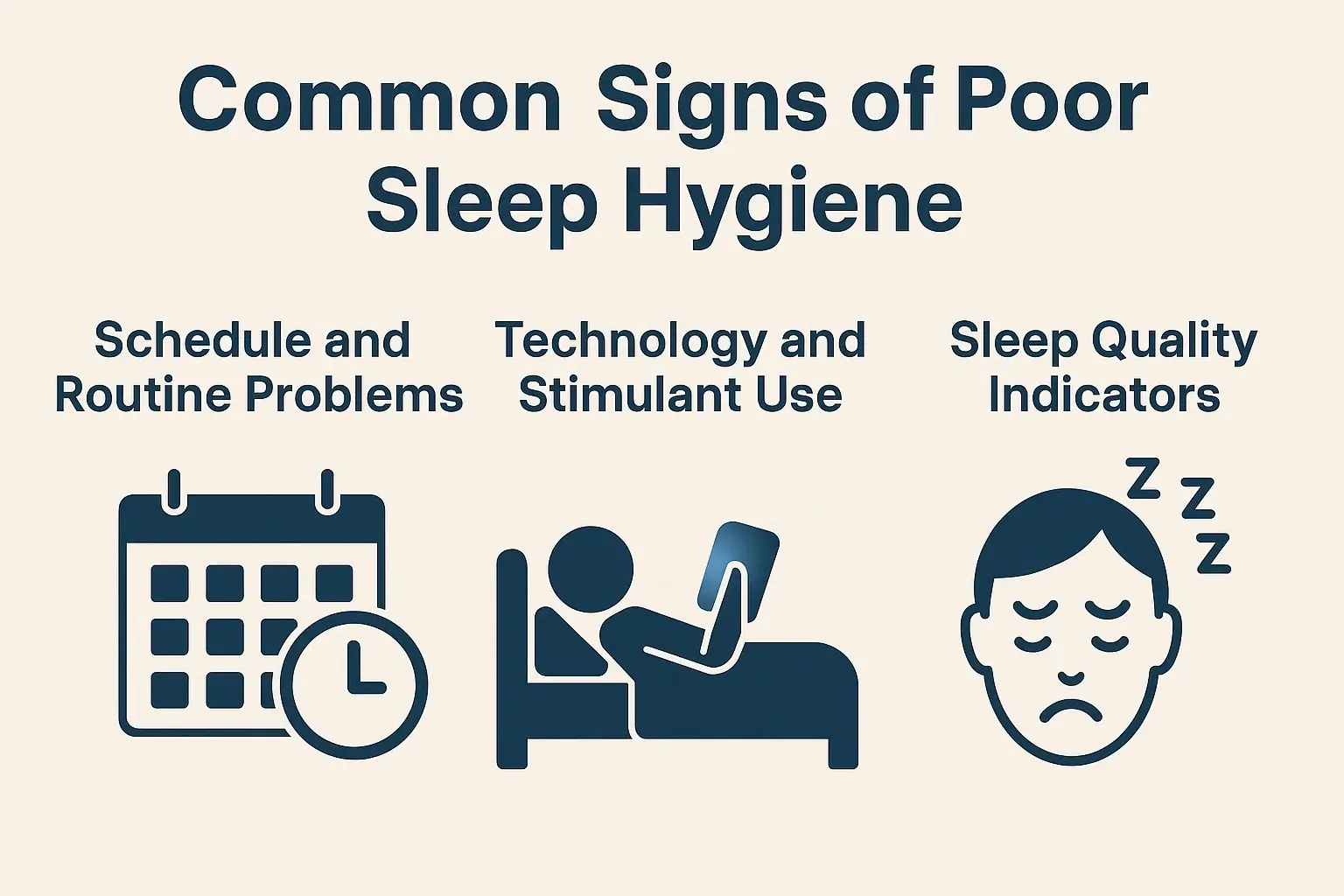 Identifying poor sleep habits helps us find ways to improve sleep quality and mental health.
Identifying poor sleep habits helps us find ways to improve sleep quality and mental health.
Schedule and Routine Problems
Irregular sleep schedules represent one of the most common sleep hygiene problems. When you go to bed and wake up at different times, your body gets confused. This makes it harder to fall asleep and wake up naturally. This irregular sleep pattern disrupts circadian rhythms. These rhythms control sleep, mood, energy, and cognitive function.
Technology and Stimulant Use
Too much screen time before bed exposes your eyes to blue light. This light reduces melatonin production, signaling to your body that it's time to sleep. Evening screen time on social media affects mental health. It delays sleep and raises anxiety and stress. This creates a double adverse effect on well-being.
Relying on caffeine or stimulants often happens when people struggle with sleep. This can lead to a harmful cycle. Caffeine consumed up to six hours before bedtime can negatively impact sleep quality. This may lead to increased fatigue and a greater reliance on caffeine.
Sleep Quality Indicators
Waking up frequently at night or experiencing poor sleep quality may indicate that you need to adjust your sleep environment or habits. Quality sleep means going through various stages several times each night. If this cycle is disrupted, you miss out on the healing benefits of sleep.
Key Sleep Hygiene Practices to Improve Mental Health
Good sleep hygiene practices help you sleep better and boost your mental health.
Consistency and Routine
A consistent sleep schedule means going to bed and waking up at the same time each day. This includes weekends, too. This consistency boosts your circadian rhythm. It becomes easier to fall asleep and wake up over time. Research indicates that adhering to a consistent sleep schedule is more important for mental health than the total amount of sleep you get.
Creating a calming bedtime routine signals your brain that sleep is approaching. This routine might include gentle stretching, reading, taking a warm bath, or using relaxation techniques. The key is consistency. Doing the same relaxing activities each night helps your brain prepare for sleep.
Environmental Optimization
Optimizing the sleep environment involves controlling light, temperature, and noise levels in your bedroom to create a conducive sleeping environment. Your bedroom should be dark, quiet, and calm, ideally at a temperature between 60°F and 67°F. Darkness promotes melatonin production, while cooler temperatures facilitate the drop in body temperature necessary for sleep onset.
Investing in blackout curtains, white noise machines, or cozy bedding can improve sleep quality. Your sleep space should feel like a peaceful sanctuary for rest, not a busy area for other activities.
Dietary Considerations
Limiting caffeine, alcohol, and heavy meals before bed helps you sleep better. Avoid caffeine for at least six hours before going to bed. Alcohol can make you feel sleepy at first. However, it disrupts sleep patterns and prevents deep, restful sleep.
Eating heavy meals before bed can cause your digestive system to work when it should be resting. This can lead to discomfort and disrupt your sleep. Light snacks are acceptable, but large meals should be avoided at least three hours before bedtime.
Relaxation Techniques
Practicing mindfulness, breathing, or relaxation techniques before sleep can calm your mind. They help reduce anxiety that can keep you awake.
Progressive muscle relaxation helps you relax by tensing and releasing muscle groups. This method eases physical tension built up during the day.
Breathing exercises, such as the 4-7-8 technique, are also beneficial. Inhale for four counts, hold for seven, and exhale for eight. These exercises activate your parasympathetic nervous system and encourage relaxation. They offer ways to manage racing thoughts linked to anxiety and improve sleep.
Lifestyle Habits That Support Better Sleep
Lifestyle choices have a significant impact on sleep quality and mental health, extending beyond just bedtime practices.
Physical Activity and Timing
The timing of exercise and physical activity significantly impacts sleep quality. Regular exercise improves sleep quality and reduces symptoms of insomnia and anxiety.
Timing matters. Vigorous exercise too close to bedtime can be stimulating, rather than promoting sleep. Most experts recommend finishing intense workouts at least three to four hours before bedtime.
Exercising in the morning or afternoon offers the best sleep benefits. It also improves mood, reduces anxiety, and supports overall mental health.
Nutrition and Sleep Quality
Foods that promote sleep include those rich in tryptophan, magnesium, and complex carbohydrates. Turkey, nuts, seeds, and whole grains boost sleep-related neurotransmitters. Magnesium is found in leafy greens and nuts. It helps relax muscles and calms the nervous system.
Avoiding large amounts of sugar and processed foods, especially at night, helps prevent blood sugar swings. These fluctuations can disrupt sleep and exacerbate mood disturbances.
Digital Boundaries
Limiting technology use in the evening extends beyond avoiding screens before bed. Set up tech-free zones in your bedroom. Also, create a digital curfew one to two hours before bed. This helps your brain relax naturally.
This boundary is crucial. Research indicates that social media has a significant impact on sleep and mental health. It often raises anxiety and disrupts circadian rhythms due to blue light exposure.
Stress Management Tools
Journaling and stress management techniques can help you process daily concerns before bed. This way, you won't ruminate while trying to sleep. Writing down your worries or making a to-do list for tomorrow can help clear your mind. This can ease your nighttime anxiety.
Other useful stress management tools are meditation, gentle yoga, or calming hobbies. These activities can help you shift from the day's busyness to evening relaxation.
Sleep Hygiene and Specific Mental Health Conditions
.webp) Different mental health conditions have specific sleep challenges. Targeted sleep hygiene can help with these issues.
Different mental health conditions have specific sleep challenges. Targeted sleep hygiene can help with these issues.
Anxiety Disorders and Sleep
Sleep and anxiety disorders create particularly challenging cycles. Anxiety makes it hard to fall asleep. Racing thoughts and tension contribute to this. Poor sleep can also increase anxiety symptoms. To improve sleep hygiene for anxiety, focus on relaxation techniques. Use worry journals to express concerns. Establish consistent routines to create predictability and lessen bedtime anxiety.
Depression and Sleep Quality
Sleep plays a key role in managing depression. It addresses both insomnia and hypersomnia, which are common issues. Some people with depression have trouble falling asleep or waking up too early. Others may sleep a lot but still feel tired.
Good sleep habits and mental health treatment for depression often include:
- Keeping consistent wake times
- Getting morning sunlight to help regulate circadian rhythms
- Avoiding daytime naps that disrupt nighttime sleep
Chronic Stress and Insomnia
Insomnia caused by chronic stress requires addressing both the sleep issues and the underlying stress sources. For stress-related insomnia, sleep hygiene practices should include stress management during the day. Set clear boundaries between work and rest time. Additionally, establish wind-down routines that signal the transition from activity to rest.
Understanding Bidirectional Relationships
Sleep and mental illness affect each other. Better sleep can lower mental health symptoms. Additionally, addressing mental health issues can lead to improved sleep. This link shows why sleep hygiene is key in mental health treatment.
When to Seek Professional Help
Some people enjoy sleep hygiene improvements. However, in some instances, professional help is necessary for optimal results.
Warning Signs Requiring Professional Support
Signs of poor sleep may point to a deeper mental health issue. These include:
- Sleep problems that last despite good sleep hygiene.
- Sleep issues with significant mood changes or feelings of hopelessness.
- Physical symptoms, such as chest pain or trouble breathing during sleep.
- Severe sleep problems that disrupt daily life.
If you struggle to fall asleep or stay asleep, even with good sleep habits, it's essential to seek help. If daytime sleepiness affects your safety or productivity, consider consulting a professional for an evaluation.
Professional Treatment Options
Sleep specialists and therapists play a crucial role when self-help measures are insufficient. Sleep specialists diagnose disorders like sleep apnea that need medical care. Mental health professionals tackle issues like anxiety, depression, or trauma that impact sleep.
One effective treatment is Cognitive Behavioral Therapy for Insomnia (CBT-I). It works well for chronic insomnia without causing medication side effects. CBT-I helps identify and change thoughts and behaviors that disrupt sleep. Healthcare providers may suggest medication when needed. However, this is often used in combination with therapy rather than on its own.
Conclusion
The link between sleep and mental health is crucial for enhancing overall well-being. Understanding the impact of sleep hygiene on mental health helps you make changes to develop better habits. Better sleep boosts mental health, which in turn enhances sleep quality.
Sleep hygiene isn't about being perfect. It's about following practices that reliably support natural sleep. Small changes in sleep habits can significantly improve mood, anxiety, stress, and mental health.
Prioritizing sleep hygiene is not selfish or lazy; it's vital self-care. Getting good sleep helps you manage stress effectively. It also enables you to manage your emotions, maintain strong relationships, and achieve your goals.
At Gendrics, we recognize sleep and mental health as essential for overall well-being. Improving sleep hygiene is key to healing. It helps with anxiety, depression, and stress. Additionally, it enhances your overall mental well-being.
Good sleep habits help most people, but if problems persist, it might mean there are bigger issues. If sleep problems keep happening or impact your life, talk to healthcare providers or mental health experts. Sleep quality is key to mental health. It's essential for overall wellness.

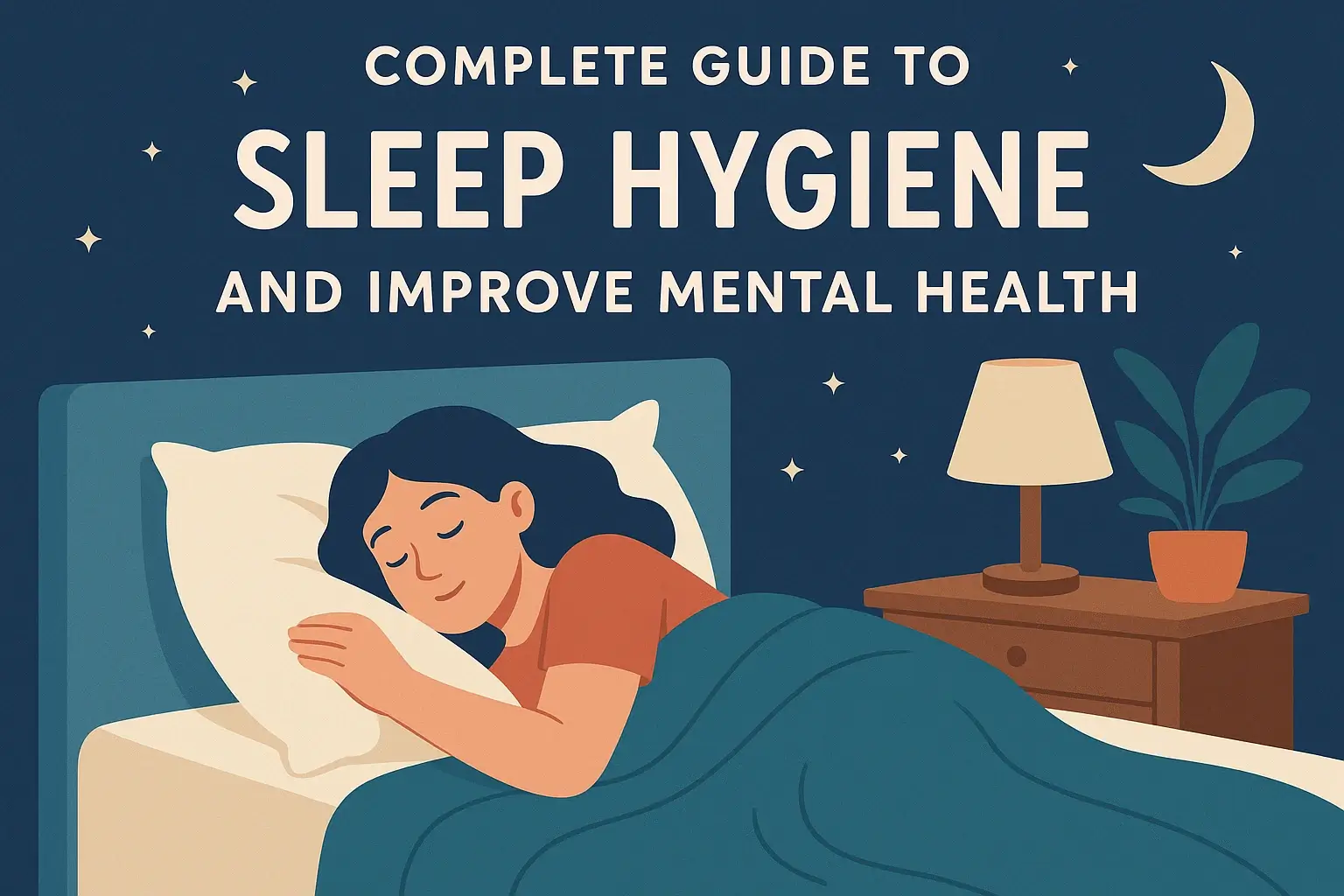
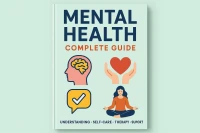
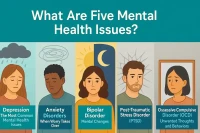
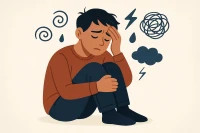
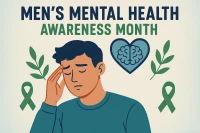
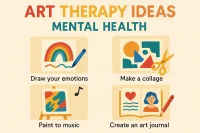
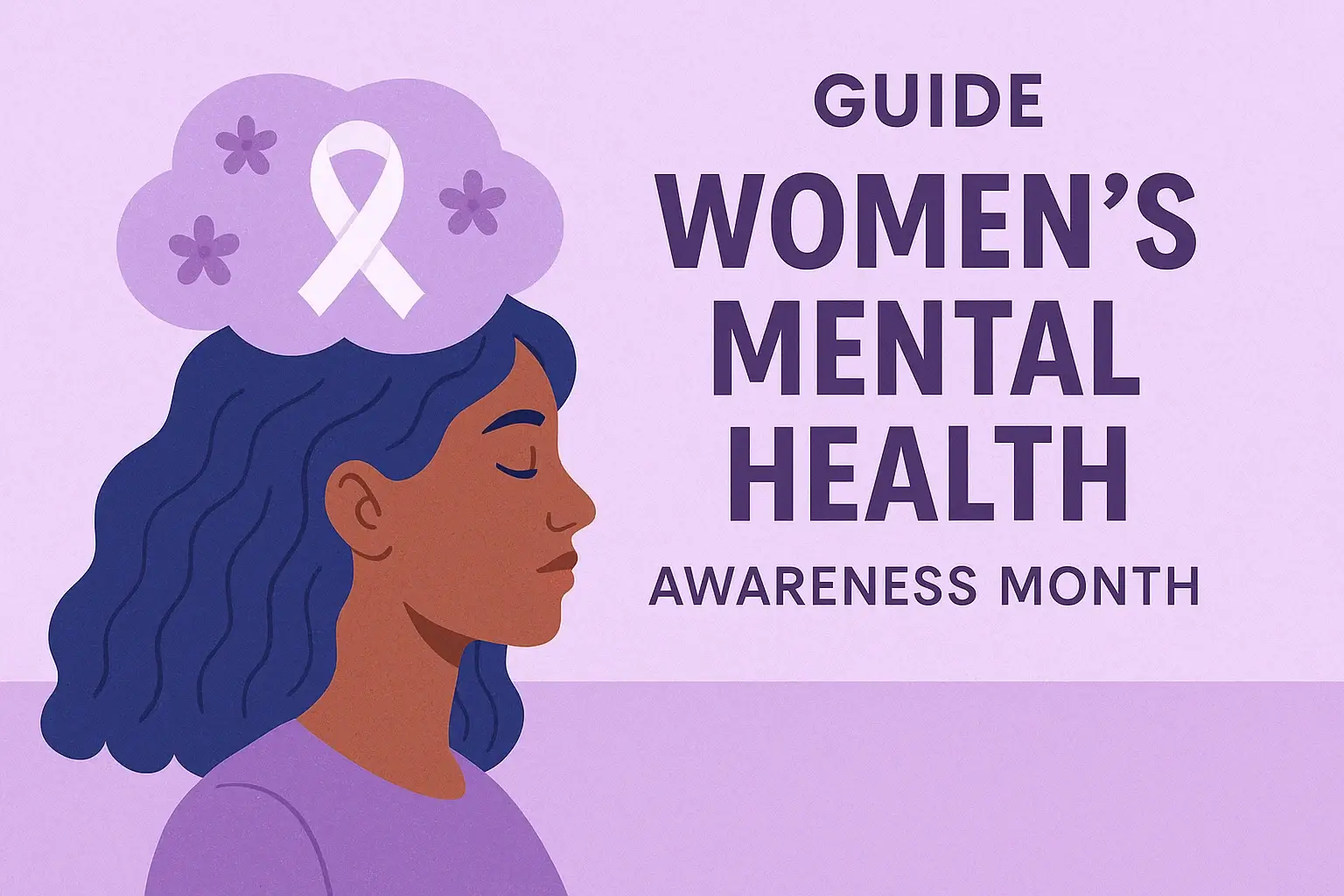
Comments